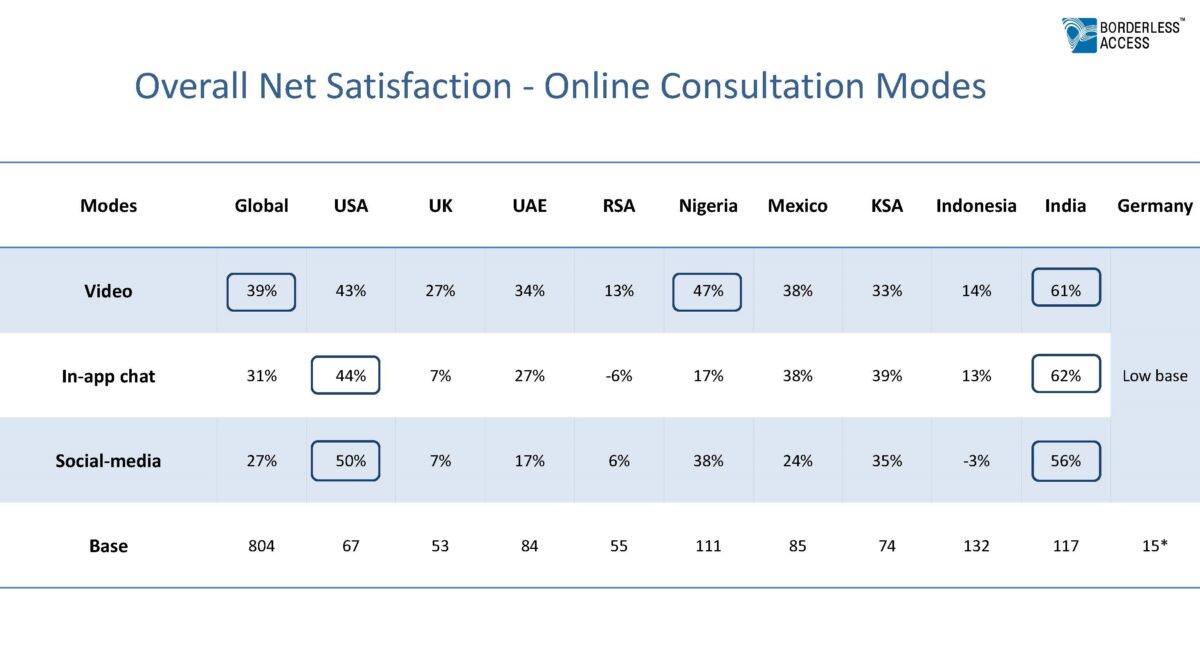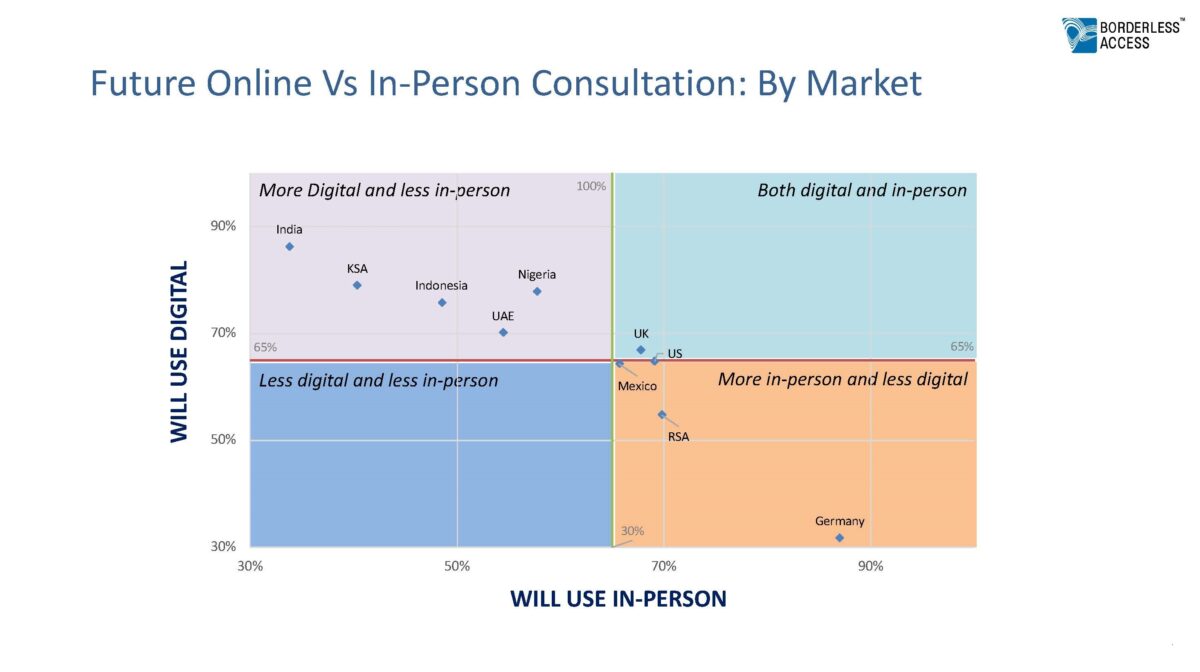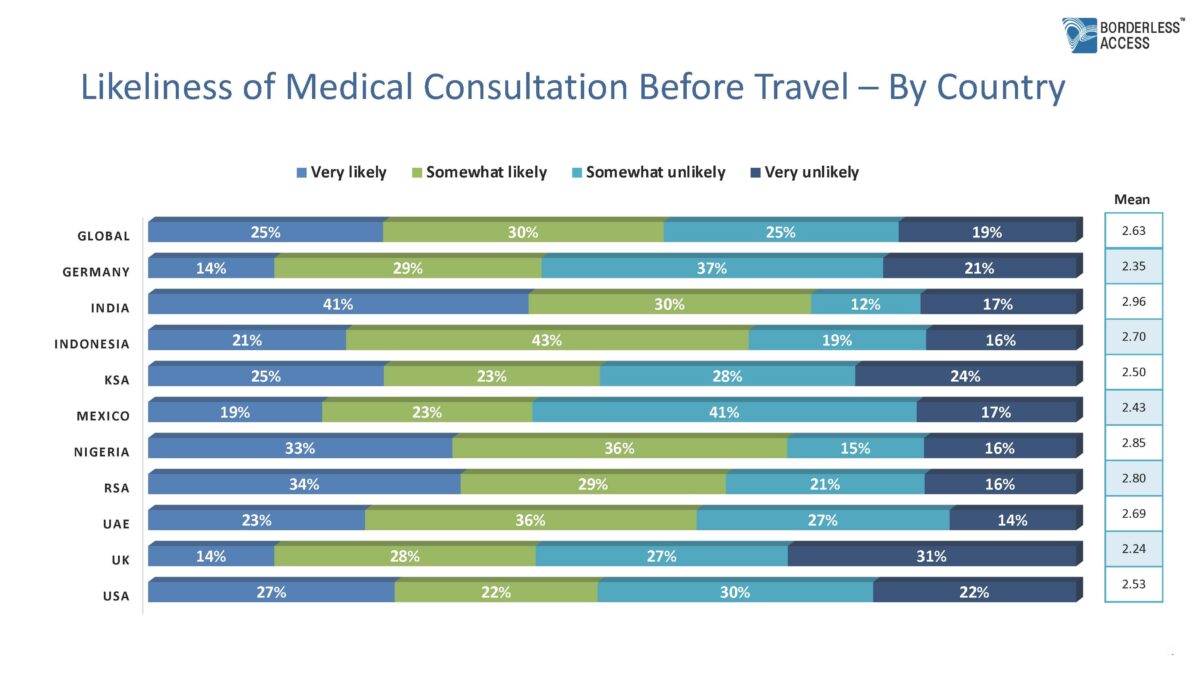The COVID-19 pandemic has changed many, once familiar, aspects of our lives. From a healthcare perspective, we’re witnessing a marked improvement in personal hygiene and an increased awareness about personal well-being. For instance, the demand for immunity boosting foods has increased and using face masks, sanitizers, washing hands frequently are now the new normal. More broadly, healthcare systems globally can be expected to become more robust, be better equipped to handle future healthcare crises. However, there’s another aspect of healthcare that’s expected to change dramatically – how we consult doctors and other healthcare specialists.
COVID-19 has forced many to switch from traditional face-to-face doctor consultation to audio/visual consultations. But the important question is: is this a temporary change or will digital doctor consultations become the new normal?
To learn more about this trend and the future implications, Borderless Access conducted an online study* with three clear goals – to understand:
- Current doctor consultation behaviours among patients
- The likely future doctor consultation behaviours among patients
- Propensity for pre-travel health consultation in the future
Doctor consultation scenarios during the COVID-19 pandemic
Unsurprisingly, in-person doctor consultation has reduced or is being avoided owing to the pandemic. As per the study, globally, only 30% of the patients continue to consult doctors, unhindered by the pandemic. The impact on doctor consultation is much lower than the global average in the US (43%) and Germany (55%), while it is the highest in the Middle East where only 18% of the patients said they visited doctors.
The study revealed a reduction in in-person consultation among households with kids, more so than households without kids. However, the use of online consultation is relatively low among both groups.
Among people who have started online consultation, video, messaging apps and social media-based consultations using phones is prevalent. Distilling it further, it was observed that most non-millennials are restricted to chat-based consultation compared to millennials who are generally more comfortable with other forms of digital communications as well.

The future of healthcare consultation
Currently, 43% of doctor consultations are online – a large enough percentage to suggest a strong growth potential for online doctor consultations in the future. Case in point: In the current scenario 80% of millennials and 63% of non-millennials said they prefer doctors who have an option for video consultation over doctors who do not. It was also observed that those who have stopped in-person doctor consultation due to the pandemic are more open to digital consultations.
Asked about their propensity for digital consultation in the future, roughly 70% of all respondents showed a great degree of preference for online consultation. This sentiment was strongly expressed by almost 80% and 60% of millennials and non-millennials respectively.
Developed countries are more conservative when it comes to doctor consultations and prefer in-person methods. Germans are the least willing to switch to digital consultation. Meanwhile, countries from the Asia-Pacific region are more willing to move towards digital consultation, with India being the most willing.

Medical consultation before travel
Even as travellers eagerly await to fly for tourism or business, personal health will continue to be a concern. People in the Middle East and Asia-Pacific are the most likely to make travel plans during 2020. However, over 50% of all travellers are expected to consult their doctors before travelling.
Travellers from African countries and Asia-Pacific are most likely to have health consultations before travelling. Notably, the probability of travellers from developed countries like the UK, USA and Germany going for a medical consultation is lower than the global average.

Most medical consultations are also expected to be restricted to general health check-ups.
However, demand for vaccinations is likely to increase among travellers. Vaccines, such as those for pneumococcus, in general, are expected to have higher traction among travellers from developed countries, while travellers from developing countries are more likely to go for general health check-ups.
Access to medication
Due to COVID-19’s rapid spread, many people faced difficulty procuring medicines, including those for critical illnesses. This crisis has impressed upon people the importance of being prepared for eventualities in the future – leading to stocking of medication
Globally, over-the-counter medication is the most common form of medication people have stocked up on (60%), followed by prescribed medicines (49%) and medicine for children (40%). Another variety of medicine that has gained traction in the last few months is immunity boosters, which 36% of all respondents said they have stocked up on. Both trends are more prevalent in developing countries of Asia-Pacific and Africa, compared to developed ones.
Looking at the point of purchase for medicines, we observed that neighbourhood pharmacies or chemists continue to be the most popular, with the global average standing at 74%. At the same time, the use of apps to order medicines is increasingly being adopted in developing in countries like Indonesia and India, which is significantly higher than the global average of 25%. Notable, preference for purchasing medicines online in developed countries including the US, UK and Germany is close to the global average.
Conclusion:
The survey was successful in highlighting what the likely future of patient-doctor consultations could be like, and also presents the opportunities for healthcare providers to facilitate a patient-centric digital healthcare.
Following are the key points from the study:
- A vast majority of patients show a propensity for digital consultation, likely influencing future behaviour.
- Developed countries are more conservative in terms of patient-doctor interactions compared to emerging markets, which are more open to adopting digital consultation methods.
- Pre-travel health consultation is expected to increase in the near future.
- Asia-Pacific and African countries are more likely to have pre-travel consultations, while developed countries are likely to see greater demand for vaccination before travels.
- People around the world, but particularly in Asia-Pacific and African countries are maintaining a medicine reserve at home, particularly of over-the-counter and immunity boosting medicines, as a direct result of hardships faced during COVID-19.
The most significant observation from the study is the shift towards digital consultation, as well as the fact that developing countries are more open to the digitization of health services and doctor consultations than developed countries.
For this digital shift to happen productively, support from healthcare providers and the health tech industry is required. For instance, people who are still on the edge of whether or not to shift to digital consultation should be encouraged by highlighting the benefits. Similarly, access to digital consultation needs to be made easier in regions where accessibility is an issue.
Few events in history have changed human behaviour on a global scale. While pandemics have happened before, an interconnected world means the impact this time has been truly global and all-encompassing. The change in patient behaviour and doctor consultation is one of the several yet significant impacts of the pandemic due to its potential to propel the present healthcare system into the future. And we should be prepared for it.
* Study conducted during last week of May 2020, with approximately 3,000 people (gen pop) across 10 markets (the USA, UK, UAE, Saudi Arabia, South Africa, Nigeria, India, Indonesia and Germany). The respondents included individuals over the age of 18 as well as families from all walks of life.


